Eric Bibb: “I love cheapo guitars that have a unique quality. They’ll tell you what songs they want to play“
One of blues guitar's storytelling greats discusses his dependency on groove, the genius of Eric Gales, and the sounds and themes of his new album, Dear America
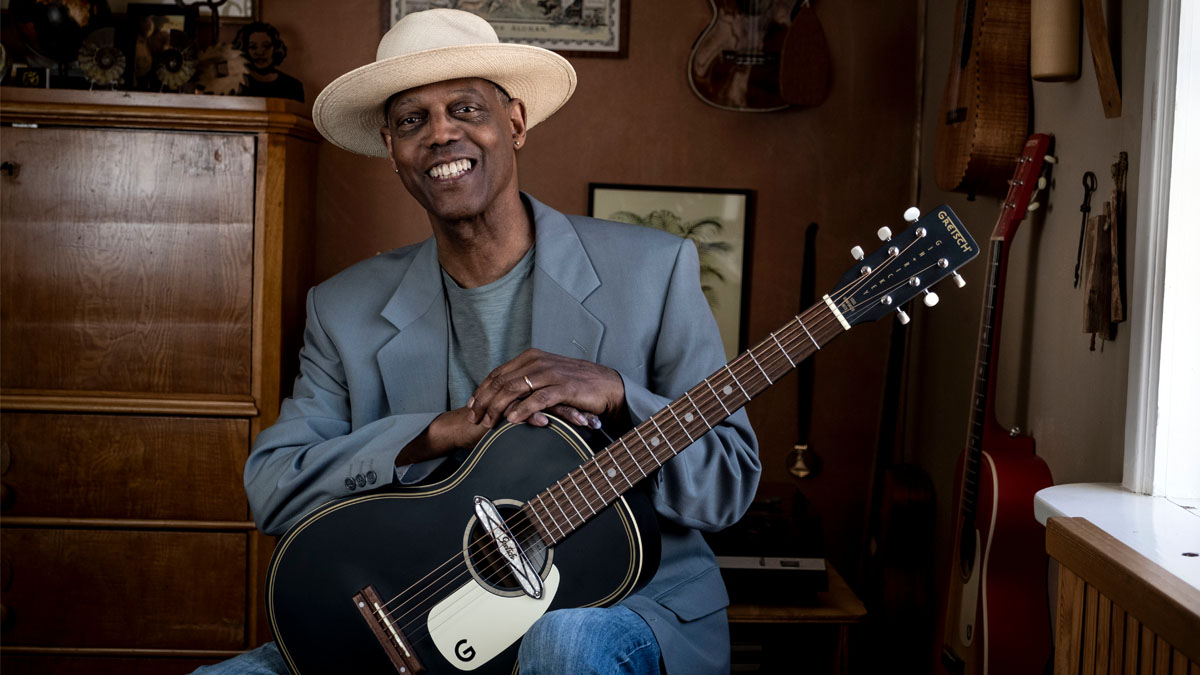
Want all the hottest music and gear news, reviews, deals, features and more, direct to your inbox? Sign up here.
You are now subscribed
Your newsletter sign-up was successful
Eric Bibb is one gifted blues guitar player. His style is rooted in folk, in the Delta, and animated by the acoustic guitar’s natural resonance. In his hands, the guitar can sit down low and earthy, Bibb plucking with his thumb as though fishing for bass notes in the mud, or it can be bright and lyrical, harmonics popping off the ‘board, but it’s almost always got a sense of forward motion, a groove to suit all tempos.
Lately, Bibb finds his groove augmented by the influence of West African rhythms, and it is growing more insistent by the day. Once established, it'll dictate how the rest of the song will go, instructing Bibb on how best to place the vocals. But Bibb approaches the guitar with a storyteller's sensibility. The groove is only part of it. On his latest album, Dear America, there are other forces shaping Bibb’s songwriting.

• Class up your solos with these 15 vintage blues guitar licks
Master the styles of Muddy Waters, Otis Rush, T-Bone Walker and more...
Having lived in Sweden for most of his adult life – and having once called France, Finland, England and elsewhere home – Bibb is looking at the place of his birth from a certain distance, and he doesn’t always like what he sees.
Producer Glen Scott gave Dear American has a sense of warmth. It sounds gently baked, homely. At times, it is a work of spiritual renewal. In song or in conversation, Bibb’s whole vibe is one of uplift. He wants you want to stop a while and luxuriate in the album's timbre, in the three-dimensional throatiness of his 12-string resonator. But the material is unsparing; honest storytelling always is. Dear America doesn’t shy away from some of the most difficult moments in the country's history.
Songs such as Emmett’s Ghost, performed with Ron Carter, confront American history and its racial animus head on. Revisiting the brutal murder of 14-year-old Emmett Till in 1955, Emmett’s Ghost examines how an African American teenager’s death galvanised the civil rights movement and reminds us that the movement still has a way to go still.
Dear America is a cri de cœur, with Bibb making his appeals to the better angels of the American people in song. But it has a message that he wants to extend to people on all corners of the world. And there is more than enough spiritual uplift to go round…
My playing has sunk from my head to the lower regions. More and more, I am finding myself depending on, leaning on some kind of groove
All the travelling you have done, living in different countries, that is really the one thing that helps change our perspective and shapes how we see the world. As a songwriter, and essentially a storyteller, that must have been invaluable for you?
Want all the hottest music and gear news, reviews, deals, features and more, direct to your inbox? Sign up here.
“You’re so right. I can’t even imagine what my perspective, my thoughts would be had I not had the experience of mixing it up with several rather different cultures from the one I am originally from. I wish everybody could have at least a taste of that experience because I think it really is helpful in times of huge conflict.”
These are times of huge conflict, but if feels like – above all else – these are times of great acceleration, in which social media assumes the role of accelerant. We are still the same species but it brings out the worst in us.
“Totally, well said. The whole speeding up, the whole acceleration of so many things, but really the evolution of empathy, let’s put it that way, is probably being abetted by the social media technology. I think we are in a position to see more clearly where we are really at, and of course what I am seeing is people who have already developed a higher sense of belonging to a larger community seem to be becoming more empathetic, and people who are more fearful, or who are not there yet, are becoming more fearful. I am seeing an intensification of both the positive and the… What can I say? The alarming! [Laughs]”
I can’t even imagine what my perspective, my thoughts would be had I not had the experience of mixing it up with several rather different cultures from the one I am originally from
It is alarming. Because you have this acceleration, but then you also have the fact that the world is a very complex place and yet people are clinging to simple interpretations of difficult problems, and there are no easy answers.
“Yes, I understand what you mean. I also understand that, like you say, in these uncertain times, of change that is not really able to be integrated as fast as it is happening, that the fear factor in some people has gotten to a point where adhering to a very kind of standard, rigid way of life and philosophy is probably their way of handling the fear of the unknown.”
We will of course get to the guitars and the writing but it is all connected.
“It is. It is all connected.”
Social media acts almost as this digital Perspex screen. We could meet people in another context, a real world neighbourly encounter, and they will see the humanity in you, they might lend your their lawnmower. But online, the screen is up, and it makes it harder to soften those divisions.
“Yes, that’s true. That really upfront, in person interaction that seems to temper the kind of polarisation that is around, that seems to be lessened. The more we have the opportunity to meet online, and to interact online, it seems like that part of it – borrowing the neighbour’s lawnmower [laughs] – is shrinking, and that’s probably not doing us much good. I think we are becoming hermit-like without even realising it.”
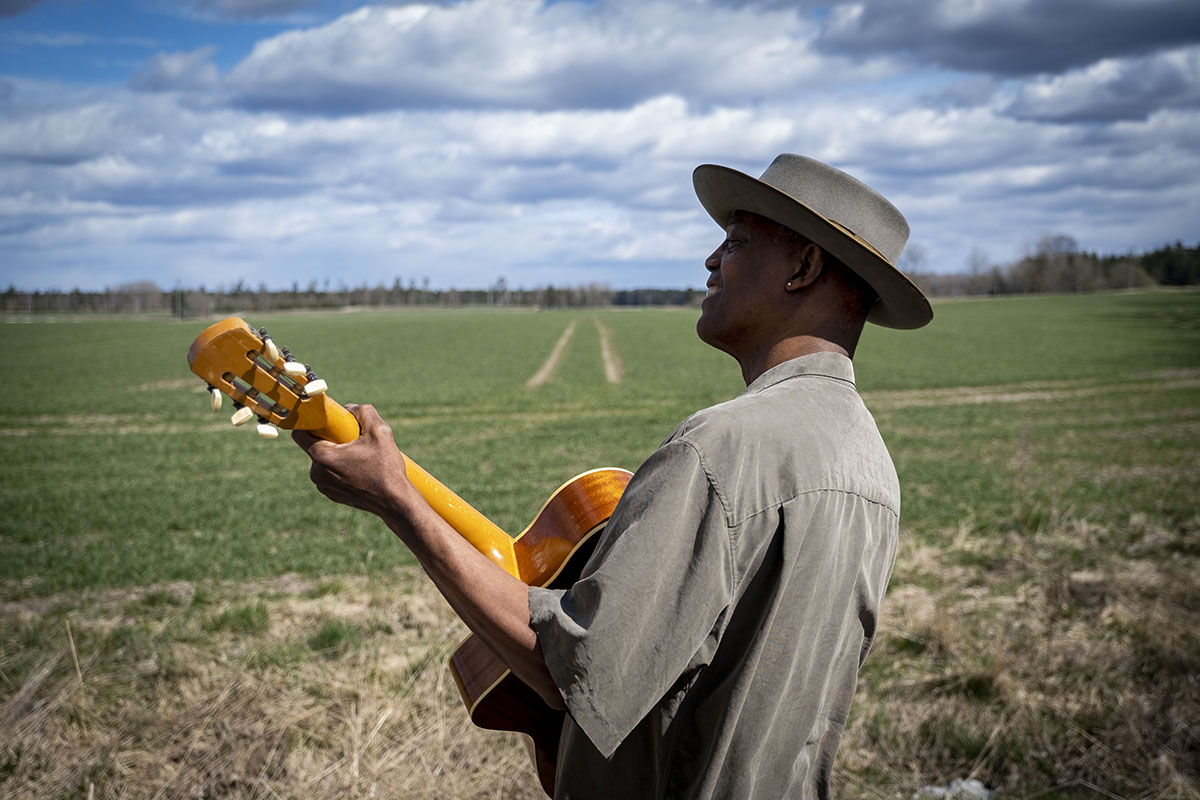
Without the travel and the fresh perspectives, and perhaps that philosophical distance, you wouldn’t have been able to write an album like Dear America. Is that fair to say?
“It’s very accurate. And I am glad you brought it up. I wish more people who interviewed me about this record would do so. I am not sure everybody is aware of my background as you might be. Some people assume that I live in the States just because I am an American and I wrote an album called Dear America, but my take on what’s going on in the world today, and in particular, what’s going on in America, has everything to do with the bit of distance that I have had for many years, and being in a position to shake off or to be free of the day-to-day anxiety that I remember from being in New York.
“And when it comes to these questions of black and white, New York is probably the place where I felt most comfortable [in the US]. I have travelled around. I have been in the South. My grandparents lived in the South. I’ve been out West. But New York is a cosmopolitan place, and that anxiety that I speak of is probably a lot less than it would be in other places. Nonetheless, never for a day was I unaware of the issues.
My take on what’s going on in the world today, and in particular, what’s going on in America, has everything to do with the bit of distance that I have had for many years
“When I first came on my own to come and settle in Sweden, I experienced something I had never experienced before. I had a bit of that feeling in France, in Paris, but not completely because it is a different place and it has another history. But in Sweden, there were long moments, stretches of time, when I was not consciously aware of being dark-skinned – even though I stuck out. The whole atmosphere just seemed to be free of a certain kind of energy that you get used to…
“I was so grateful for the opportunity to be able to breathe and observe, to sing and play, and meet friends and have a beer, and not be consciously aware of this schism between people. So, yes, it has everything to do with my take on the subjects I wrote about.”
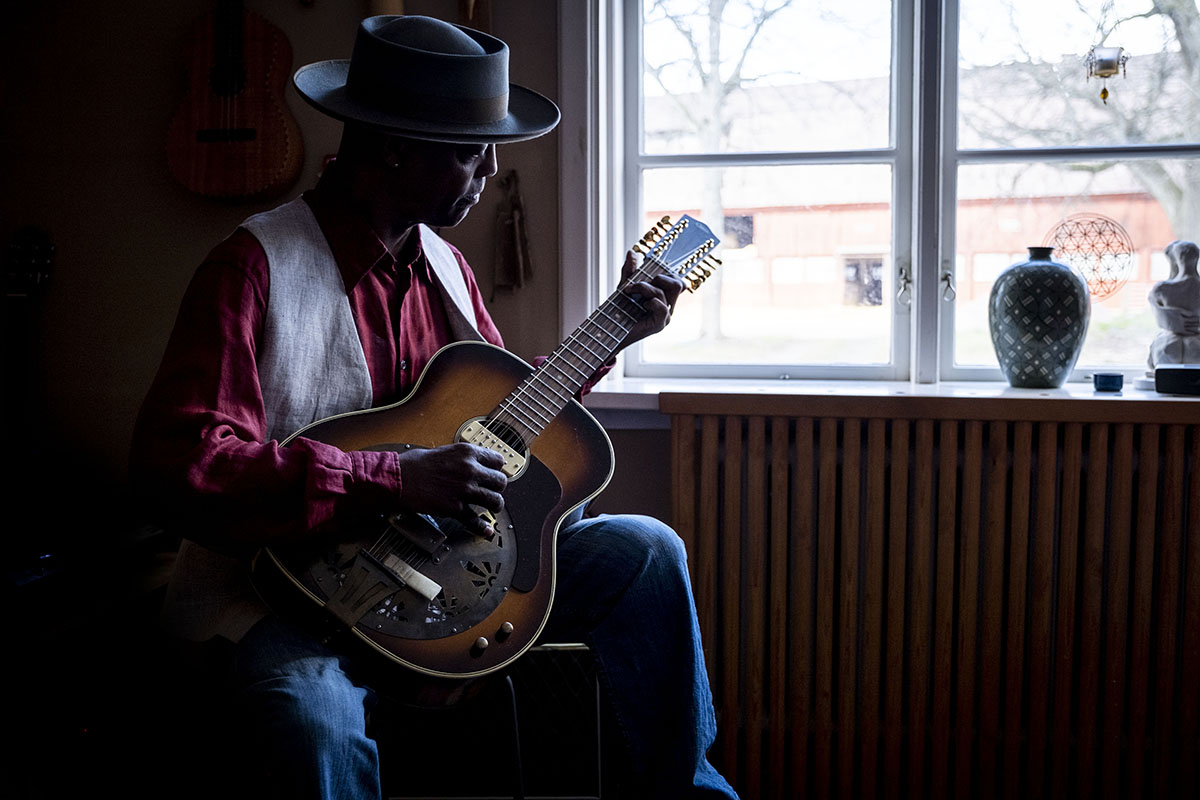
Those experiences in Sweden would give you an emotional space, some room to relax into a sense of yourself.
“Very much so.”
And that experience would seem to be the ideal state, in which race is the least-interesting interesting thing about us…
“As you say, it is on one level superficial, but that superficial difference has become symbolic of huge gaps in experience, and it you have to go back in history. You have to really look at colonialism. You have to look at slavery, at all of that. But it’s amazing how something like the colour of one's skin is attached to so many other ways of evaluating people, and judging people, and treating them, etc. It is unendingly fascinating, and at times it is very depressing, and also, it is wonderful to get past all that and actually meet in a human zone and really communicate – as we’re doing. I needed it.
“I’ll give you an example. I had a very interesting experience just a couple of minutes ago. My wife told me about a comment on social media. Someone had responded to the song Emmett’s Ghost in a very negative way, which made me know that they were not very worldly, and that they were quite burdened with racial prejudice. And it depressed me for a minute because I know this is out there, that is why I care about these subjects and write about them. It really brought me down for a minute.
I tell students, you have to have an idea with enough juice for you to draw it out, to say the same thing, perhaps in different ways, over and over, and make a song
“Then I realised that, okay, you can own that feeling and you can analyse it and get past it, but I think about people 60 years ago who were in the middle of a much more intense life-and-death struggle. People who where in the American south, trying to register people to vote – white and black, but mostly black. People who were living daily with the threat of being murdered, y’know! And I think, ‘Okay, you might be a little weary, you might feel a little down, but let’s put it in perspective, man.’ And here I am talking to you on a phone that is like something you’d see in the Jetsons films. [Laughs] We have to look at the upside of things as well.”
Do you approach songwriting with the idea, the lyrics first, and let the music fall in behind it?
“The idea often comes first but sometimes I can just be noodling around on the guitar and find something that is interesting and inspiring, and then unbidden, some thought will come to me, and I’ll just have a go at it and something will turn out to be a good song. More often, and in particular with the songs on Dear America, the idea came first.
“Take Emmett’s Ghost. I saw a wonderful, quite disturbing documentary about the life of Sam Cooke, and in that documentary – The Two Killings of Sam Cooke – was a reference to Emmett Till, and that reminder triggered a recollection that became the core of that song. I remembered, when I was 10 years old, leafing through this book of my parents’, and I kind of buried that experience because it really was quite traumatic for me, and it only came up years and years later when I saw this film.
I don’t know any guitar player, any modern guitar player, who has what Eric Gales has – that fire, that juice. And it is effortless!
“It’s what I call a ‘pregnant idea’. I think a good song often begins with that. I tell students, you have to have an idea with enough juice for you to draw it out, to say the same thing, perhaps in different ways, over and over, and make a song – and the story of Emmett Till is a story with enough juice for scores of songs. But again, the song almost unravelled in real time with both guitar part and melody and words coming, more or less, in parallel with each other. I didn’t have a whole text written out about that.
“There are other songs that do that, but that particular one – there was enough emotion to fuel it. That’s it, there was enough personal emotion and engagement to fuel or to open up a channel. I guess I got some help, my muse kicked in and said, ‘Eric, you are a storyteller, this story means a lot to you, you’re going to be able to tell it in a poignant way.’ And then it happened.”
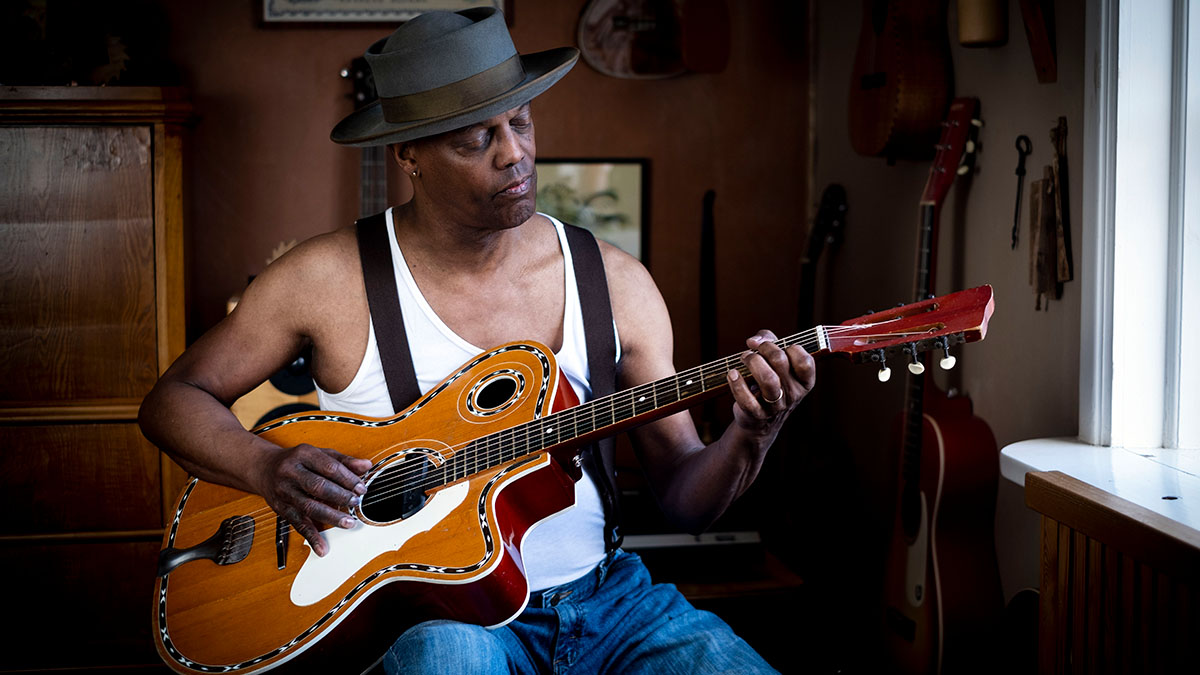
Isn’t that the magic. It could be Proust with his madeleine, or it could be something more profound, but even a smell that reminds you of home can just animate your creativity, like having air behind the ideas and you don’t have to work at it and that’s the beautiful part of creating.
“You know it. You obviously know it. It is. You feel like you are floating.”
There’s something about the sound on this record that does something similarly magical. The cadence of your voice, the timbre of the guitar, it’s a very warm sound. Everything is warmth on this record.
“Oh I like that!”
How did you do that?
“I can’t take credit for that. My producer, his name is Glen Scott, he grew up in London of Jamaican parents, and he now lives in Sweden. He was living in London when we made this album, then we went to New York to record parts of it. He is such a connoisseur of not only music but sound, timbre, and that warmth that you talk about, that’s something that he is really a stickler for.
“There are so many ways to record. There are so many variables. But I give him credit for creating that ambience and that warmth, that really meshed with the stories I was telling.”
It’s funny. You could almost eat it. When sound really appeals to you it transcends the audio experience.
“Yeah, I agree. It goes into some kind of cosmic dimension, that all is one. I love your comment, ‘It makes me want to eat it.’ I understand what you mean, yeah.”
How did you record the album? There’s not that much instrumentation – did that give you a little more freedom?
“Again, it is a more complex process than you might think. First of all, I had a chance to go back to New York, to a great studio, with a great engineer, but also with my producer Glen Scott – and he’s a genius. What we came with was, we’d had actually begun the record. I could start something, record a guitar part in my friend’s house or in my bedroom with my sound engineer bringing over his portable laptop stuff, and I would record something to a click-track so that it wouldn’t be problem for someone else to add to.
We were recording in every possible way that you can record; live on the floor, overdubs sent through cyberspace, the whole nine yards!
“It was a combination of live sessions and basically starting a song with a guitar and vocal, and having my producer take it apart, dissemble it, put it back together. And he is a genius at that kind of thing. It seems seamless, but we were recording in every possible way that you can record; live on the floor, overdubs sent through cyberspace, the whole nine yards!”
What guitars were you using on the record? We’ve seen you with the Gretsch Jim Dandy acoustics, big-bodied acoustics, what’s on the album?
“Let me show you something. [Leaves room] So, you are a guitar player, too, right? This guitar is an instrument with a plywood top, a cheap guitar, made in Sofia, Bulgaria, and I found it years ago in an old music shop in the south of Sweden. It had no case. I paid about £50 for it. I took it on the train back home to Stockholm, without a case, and played it all the way. It has an amazingly unique sound.
“The double soundholes have something to do with it because you get almost a phasing effect, a chorus effect between them, and it’s got a resonance that is like no other guitar I have. And I think that the fact that it is not expensive tonewood, the fact that I have never had it adjusted – it just is what it is. It has a very brittle kind of self-echoing, self-reverb’ing guitar [tone]. It is great for certain fingerpicking things, because it does not have much sustain. You can really hear [the notes] distinctly, almost like a harpsichord.”
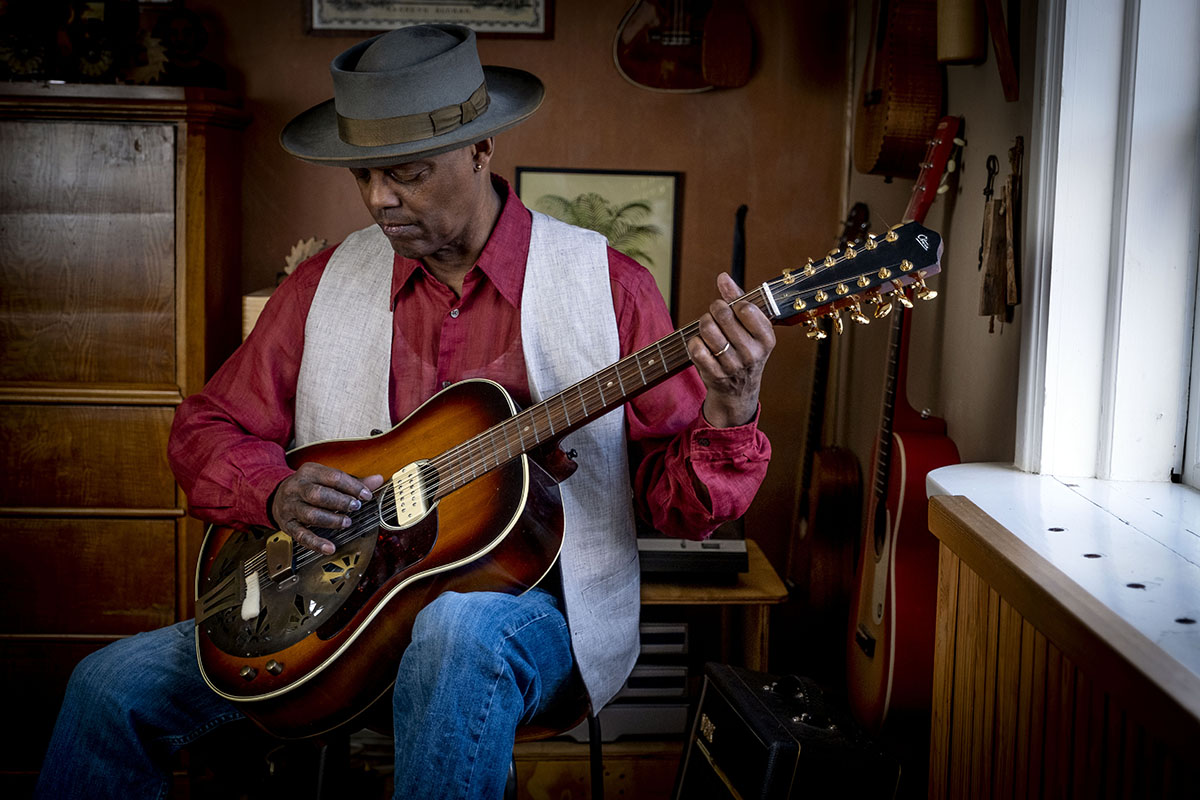
And you have a resonator there, too.
“The other guitar that I wanted to point out, being a little bit unusual, is this 12-string, which is a ResoPhonic 12-string, and it is a guitar that was custom-rebuilt because the original guitar had no ResoPhonic, no resonator. So, someone put that in. They put in the electronics. But it’s an old East German 12-string, like, a real tractor of a guitar. I put some new tuners on. It’s called an Otwin, and I love it. It has a magical sound. It almost sounds like a clarsach, and that’s the one I use on the song Born Of A Woman.”
Yes, absolutely, and it goes so well with the vocal. Is that an L.R. Baggs soundhole pickup?
“Let’s see. It might be. Yes, it looks like it could be but I don’t see the marks, but it is obviously a magnetic pickup.”
The tone of both of those guitars adds so much to these songs. That Bulgarian acoustic has got an almost frazzled quality to it.
“Yes, I don’t want to take it out on tour if I ever get back to touring, so I actually bought another guitar that is also from Bulgaria, the same company, but it doesn’t have the exact same sound because it is a little thinner in the body. And it’s got some qualities that are similar but this guitar is just one of a kind. I’ve been debating whether to put a pickup in it or not, but we'll see what happens.”
The beauty of cheap guitars is that they can never disappoint you.
“Exactly, that’s true.”
They can only pleasantly surprise you. I love underdog guitars.
“Me too. Me too. I love cheapo guitars that have a unique quality. Y’know, they’ll tell you what songs they want to play. If you have like I do, the opportunity to compare, I’ll start a song on one guitar and then realise that, y’know, that’s okay, but I think it would actually marry this guitar better and I’ll switch. Or I will start a song on a guitar and then realise that the song came about because of the sound of that guitar, and it doesn’t really sound the same or as good, or as convincing, or whatever, when I switch to another instrument.”
These days, whether it is a ballad or an up-tempo tune, I really need to lock into a groove, and the groove will actually then dictate my touch and how I phrase my vocals
That 12-string resonator with a magnetic pickup, the Otwin, that’s very you. It’s a folkie instrument choice, and of course, you are folk, too – it’s all one continuum – but you park it in a blues rhythm, down low, and it sounds great driving the rhythm.
“I like the fact that you mention the rhythmic thing. For me, what has become really essential in my performance and the way I write and play guitar, is that rhythmic quality, that rolling rhythmic quality. These days, whether it is a ballad or an up-tempo tune, I really need to lock into a groove, and the groove will actually then dictate my touch and how I phrase my vocals and all that kind of stuff.
“Perhaps it is an influence from the West African music I have been fascinated with, kora music et cetera, but I really need to have that rolling but still a real body-centred groove. That’s where my playing has gotten. It has sunk from my head to the lower regions. More and more, I am finding myself depending on, leaning on some kind of groove – even when I am playing alone with no percussion or anything like that.”
In your songwriting, the lyrics and the verse, they naturally want to sit back a little and the groove is giving it the forward motion – as though the guitar is leaning forward, towing the song along.
“You’re right about that! And when you have that, you don’t have to hit it so hard, because the propulsion of the groove and the groove itself is so body-orientated and so satisfying that you find yourself letting it do the work.”
We must ask you about Eric Gales contribution on Whole World's Got The Blues. He is phenomenal. He brings the juice when he picks up a guitar, pure juice.
“I don’t know any guitar player, any modern guitar player, who has what he has, which is, like you say, that fire, that juice. And it is effortless! You see him playing in person, and you’re standing next to him, you realise that it is like breathing for him. I don’t know how many hours this man has spent on the guitar – obviously he has put in his many ten thousands in! I don’t know…
It’s like Paco de Lucía, like immediate. It’s not thought-dominated. It’s just there! It’s just there. His ability to basically just quote the masters of the old-school blues playing, like Otis Rush or something, with a sensibility and an awareness, and a modern sophistication at the same time, I don’t know anyone who plays like this. He’s incomparable. That’s all I can say.”
- Dear America is available to preorder, arriving 10 September via Provogue.
Jonathan Horsley has been writing about guitars and guitar culture since 2005, playing them since 1990, and regularly contributes to MusicRadar, Total Guitar and Guitar World. He uses Jazz III nylon picks, 10s during the week, 9s at the weekend, and shamefully still struggles with rhythm figure one of Van Halen’s Panama.
